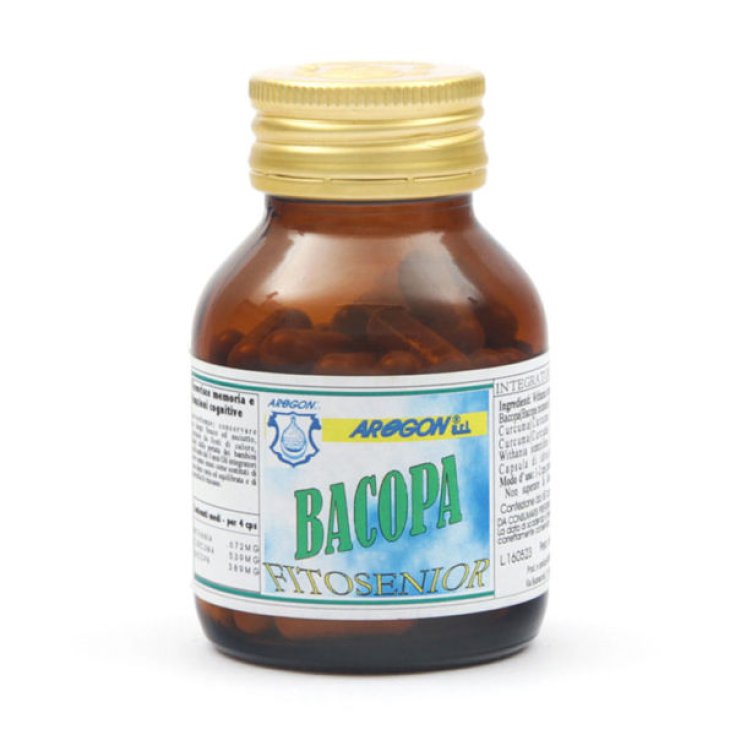Aregon Fitosenior Bacopa Food Supplement 60 Capsules
- Brand: AREGON Srl
- Product Code: 922261437
- EAN:
- Availability: In 10 - 14 Days
- Purchase 3 items for 18.70€ each
- Purchase 4 items for 18.32€ each
- Purchase 5 items for 17.94€ each
Oregon
Bacopa Fitosenior
Indications
Promotes an antioxidant effect (general antioxidant, including memory problems).
Dosage and method of use
Take 1-2 capsules before breakfast and 1-2 capsules after dinner.
Property
Bacopa monnieri (fam. Scrofulariaceae):
plant of Ayurvedic tradition, it grows spontaneously in very humid and hot Indian regions, often along the banks of rivers. Some active ingredients have been extracted, isolated and identified from the whole Bacopa plant, the main ones being "saponins", which the first pharmacological studies have designated to be responsible for the tonic-nerve effect of the plant. Among the saponins, Bacoside A (left-handed) and Bacoside B (right-handed) have been isolated and characterized in their biochemical structure. However, they are very similar in that they have the same sugar group and the same nucleus. Other components are herpestine, betulic acid, D-mannitol, some sitosterols, including Beta-sitosterol. The studies on the activity of Bacopa extract on the nervous system, and in particular on the states of memory deficit and slowed learning, are inspired by the use of the plant in traditional Indian medicine, where it is known with the name of Brahmi. Pharmacological studies have shown that following forced sleep deprivation (analogous to a stressful situation) learning abilities worsen, with an alteration in the levels of brain biogenic amines, such as serotonin and ilglutamate (which increase) and GABA, acid gamma-amino-butyric acid (which decreases). What remains little known for now is the mechanism of action. The first screenings suggest that Bacosides act inside the hippocampus. They appear to help repair neuronal damage by stimulating a kinase, a brain enzyme responsible for the formation of new neuronal elements. The new neurons can thus replace the damaged ones, favoring the memory processes. Furthermore, it seems that in this process of renewal of the "structures" there is also the strengthening of some neuronal receptors which can thus omit their activity in the damaged synapses. The brain and the nervous system are particularly exposed to the damage exerted by free radicals as they are rich in lipids and iron, both of which are causal in generating reactive oxygen species. The damage caused by free radicals causes a loss of neurons, typical of some neurodegenerative diseases.
The Withania:
it has been used for centuries in the insults associated with oxidative damage and through some research it has been tried to codify whether the action of the drug was due to its antioxidant activity. For this purpose, the activity of Withania (the sitoindosides and the witafarin A) was studied on some free radical scavenging enzymes, that is superoxidodisumatase, catalase and glutathione peroxidase: a reduced activity of these enzymes leads to an accumulation of free radicals with consequent effects degenerative. A conglicowitanolides treatment (10 or 20 mg / kg ip) increases the level of the enzymes superoxide dismutase, catalase and glutathione peroxidase in rats, confirming a net antioxidant action of Withania.
Turmeric:
from the important antioxidant and hypolipidemic action sanctioned by Indian researchers (1999), who confirmed that curcumin has a neuroprotective effect against the damage to the rat brain induced by ethanol: turmeric causes a significant inversion of lipid peroxidation of brain lipids and increases the production of the antioxidant glutathione. In 2001, US researchers, starting from the assumption that the oxidative stress induced by beta-Amyloid (beta A) is at the basis of neuronal cell death, found that Curcuma and its curcuminoids (curcumin, demethoxy curcumin and bisdemethoxy curcumin) defend the cells from the attack of beta - A, thanks to the strong antioxidant action, greater than alpha-tocopherol. The same American researchers in a subsequent experimental work have shown that calebin-A, a new curcuminoid isolated from turmeric, also protects neuronal cells from the damage caused by beta-amyloid, thanks to its antioxidant action.
Contraindications
In pregnancy (there are no specific trials).
Side effects
Known hypersensitivity to one or more components present.
Warnings
Keep out of the reach of children under 3 years of age.
Supplements are not intended as a substitute for a varied and balanced diet and healthy lifestyle.
storage
Store in a cool and dry place, away from heat sources.
Components
Withania somnifera L. root powder; bacopa monnieri L. whole plant dry extract; curcuma longa L. rhizomes dry extract; curcuma longa L. rhizomes powder; withaniasomnifera L. root dry extract; hydroxypropylmethylcellulose capsule.
Format
60 vegetarian capsules of 500 mg.
Cod. FS09

